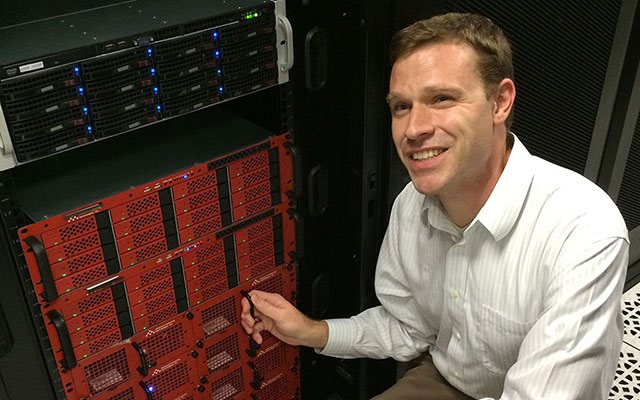Dr. Greg Bowman, an associate professor of biochemistry and molecular biophysics at Washington University School of Medicine in St. Louis, oversees the largest crowd-sourced computational biology project the world has ever seen – called Folding@home. The project relies on the power of tens of thousands of home computers to perform the complex calculations required to simulate the dynamics of the Covid-19 proteins. At the moment, the Folding@home team is using 5 million devices powered by 4.5 million CPUs (31 million CPU cores) along with half a million GPUs to study Covid-19.
 More than 100 simulation projects are currently underway via Folding@home to study the Covid-19 proteins. With all of these simulations underway, the big challenge facing Dr. Bowman and his project is data analysis. To solve that problem, he has turned to Advanced Clustering Technologies to provide high performance computing hardware equal to the task of analyzing his huge datasets.
More than 100 simulation projects are currently underway via Folding@home to study the Covid-19 proteins. With all of these simulations underway, the big challenge facing Dr. Bowman and his project is data analysis. To solve that problem, he has turned to Advanced Clustering Technologies to provide high performance computing hardware equal to the task of analyzing his huge datasets.
Data-Driven Decisions

Dr. Greg Bowman inspects Advanced Clustering hardware that has helped analyze huge data sets.
“We are bringing in 6TB of data per hour,” Bowman said. “It’s a huge amount of data to analyze, so we need significant hardware on our end to run the analysis. As we bring in this equipment, the question will be, ‘How fast can we humans decide on the next step.’ The technology is there to support us. We just need to be able to make those decisions. That’s exactly where we want to be as scientists.”
The HPC equipment Bowman is acquiring for his project will be quite an upgrade. The new system is built upon Advanced Clustering Technologies’ ACTblade e230, which provides up to four independent AMD EPYC compute nodes with 8 drives in one chassis. This blade combines storage, networking and computing in a single system to increase scalability and reduce datacenter complexity.
“Most of the data analysis we’re currently doing relies on six-year-old high performance computing machines that offer 240 cpu cores. The new machines will use AMD EPYC 7742 processors providing 1,500 cpu cores. That’s a nice boost of our throughput.”
Complete the form at right to request your copy of our Folding@home HPC case study.
